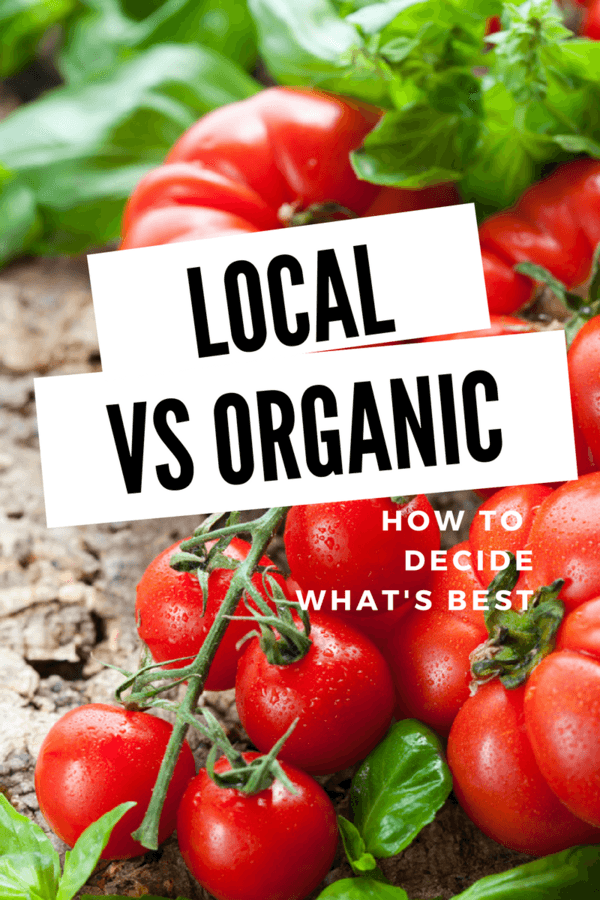
Over the last few years, there have been many studies that have shown that organic foods are no more healthier than conventional foods… in many cases, they are posted to Facebook where people quickly respond with “See! I KNEW organic is nothing but a scam to make more money!” ;)
Looking at that study, many people would just accept that as being true – and if money is tight, and you have always been on the fence about whether or not it truly is worth it, these studies would probably cause you to just accept that statement as true and progress along your day, as you continue to just buy what is affordable whether or not it’s organic.
Hopefully you can look past some of these studies, however, to really think about what the local media reports – in most cases, these studies suggest that organic produce is no more nutritious than conventional produce.
And to a certain extent, that’s somewhat true.
But… one thing that was sorely missed is that eating organic foods MAY reduce your exposure to herbicides and pesticides in addition to antibiotic resistant bacteria. .. which are chemicals that have been shown to cause health problems. These chemicals have the most impact on children and the elderly – and an even greater effect on unborn children… not to mention these chemicals can accumulate and result in a series of health problems (food allergies, chronic illness, and hormone disruption to name a few).
It’s obvious that organic is nutritious – but when it comes to Organic OR Local, what is the better alternative?
Not everyone may understand that organic is far different than local produce – for some, it might all seem one & the same.
Just this week, one of my older brothers was talking to be about our Dad – and how food particular he is. I don’t really think he’s food particular, but then he does things similar to what we do and so I don’t see it quite as much. He picks up his produce from a local co-op, it’s grown by local farmers without pesticides and herbicides. He’s adamant about his produce – my brother, not so much. My brother thinks it’s silly that someone would shop at a co-op… when they can buy organic produce at Walmart, not really understanding that organic produce at Walmart might not be “local” — and definitely has it’s disadvantages.
That conversation made me think about things I already knew were so obvious – not everyone has the same mindset, and some don’t have as much knowledge as others when it comes to their food.
Local versus Organic
The Stanford Study performed HERE simply states that organic produce doesn’t have any greater benefit than conventional. Yet, the study does not seem to take into account that there are obvious differences between new organic farms and mature organic farms. Mature farms have more nutrient rich soil, while new organic farms haven’t reached their full potential yet. The study doesn’t really consider one of the things I see as the biggest difference between local and organic: the time that the produce is out of the soil before it hits the mouth of the consumer.
If you have been part of a CSA (local community share) long enough, that’s probably something that you notice more than anything – when you pick up local produce, it lasts SO much longer. That’s because it’s coming from your local farmer.. in your area – not trucked in hundreds of thousands of miles.
Most produce sold at the supermarket comes from Florida, Mexico, California.. rarely from local farms. There may be a few things that come from local farmers .. but in most cases the food comes from a distance. It’s picked, and it travels in a dark truck to the store where it sits on shelves or in a produce area until it hits the sales floor days later. Or, in some cases, even a week later.
One of the biggest problems with food that travels a distance is that it loses nutrient value once it comes out of the ground – these items are picked and they travel for up to a week before they reach your produce aisle. In the process, they have lost considerable nutrients (see this study here).
Have you ever bought produce at the grocery store and seen it turn quickly? It’s one of my biggest gripes about buying produce at ANY supermarket.
Guess what? This nutrient loss happens to produce of all kinds – both conventional AND organic.
Buying at a farmers market or being part of a CSA (or, growing your own!) is a much better option. Since the produce is picked right before the market, or (in terms of a CSA), the day before pick up, the nutrient content is more dense.
Which One to Choose?
Organic produce is always a great option – but if you are faced with the choice between local OR organic, it’s important to consider both options.
You can, in many cases, pick up local organic produce – as part of a CSA, many local farmers, grow their produce pesticide and herbicide free, giving you the very best option.
If local organic is not available (as in a farmer’s market or CSA), and you are concerned about pesticide or antibiotic exposure, then organic might be a better choice than local {conventional} produce.
But the best choice, hands down, is to buy local, organic produce… as you will get the greatest nutrient content and lowest levels of pesticides. And if budget is a concern to you in that area, then consider joining a CSA program – as that route is an inexpensive and affordable way to buy organic, local, seasonal produce all the while supporting your local farmers.




Leave a Reply
You must be logged in to post a comment.